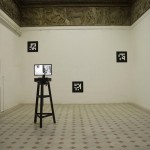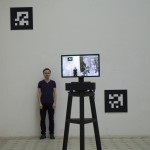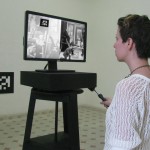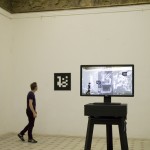Kibővített Emlékezet / Augmented Memory
Parthenón-fríz Hall Budapest
02.05.2012-12.05.2012
Valós és virtuális világ egymástól határozottan elválasztva létezik, munkámmal arra teszek kísérletet, hogy ezt a határt elmossam, azaz egymásra helyezzem a két területet. Kutatásom az immerzív és augmentált virtuális valóságok lehetőségeit vizsgálja a képzőművészetben.
Projektem megvalósítására a budapesti Epreskert Parthenón-fríz termében került sor. E térben alkotott egykor Stróbl Alajos szobrász, aki számos híres magyar személyiség portréját készítette el, ott, az Epreskerti műteremben. Kutatásom során közel húsz archív felvételt találtam, melyek – bár különböző időben, de nagyjából – az 1900-as évek elejéről származnak. A teremben készült fotókat kódokhoz rendeltem, és azokat eredeti helyükre pozícionáltam. Egy monitoron keresztül így lehetőség nyílt, – ha csak elméleti síkon is, a tér különböző időben való szemlélésére. Az interfész forgatásával lehetőség nyílt megmutatni a tér több mint száz évvel ezelőtti állapotát.
A szobrászat új lehetőségeit kutatva találtam rá a kibővített tér (Augmented Reality – AR) szoftverre. Az AR, mely kódok segítségével ad hozzá a látványhoz, megjeleníthet két vagy háromdimenziós alakzatokat, de akár animációt vagy hangokat is. Bár az alkalmazott technika nem a legújabb, a felhasználási lehetőségei még nyitottak, érdekes kérdéseket és új gondolati tartalmakat vethetnek fel. Munkámban a szoftver felhasználásával egymásra csúsztatom az idősíkokat, a valódi teret hozzáadott információkkal egészítve ki.
A kiállítás az Európai Unió támogatásával valósul meg, a Magyar Képzőművészeti Egyetem Doktori Iskola TÁMOP pályázati projekt részeként. A szoftver fejlesztésében kutatásvezetőm Szegedy-Maszák Zoltán Dr. habil DLA, a Doktori Iskola vezetője támogatott, a tér rekonstruálásában a Stróbl család archív felvételei segítettek. A munkámhoz szükséges egyéb technikai segítséget a Lizard Web Media Kft szolgáltatta.
The divide between the virtual and real worlds is narrowing, my project intends to make an attempt to lift the border and superimpose these two worlds. My research is focusing on the artistic usage and possibilities of immerse and augmented virtual reality.
The room where I realized my project was the Parthenon-friz Hall which had been the atelier of a Hungarian artist Alajos Strobl in the beginning of the, 20th century . As he was one of the initiators of fine art education in Hungary, the installation had a historical layer as well.
During my research I found several archive photographies of the room, taken in different years, but mostly in the beginning of the last century. I bounded the photos and codes, and projected them to their original position in the space, thus it was possible to observe the room in different periods of time by using a monitor: the turning of the interface enabled the visitor to experience the reconstructed space.
While doing my research on artistic usage of new technologies, I stumbled across the Augmented Reality software that I found really interesting. The AR programme uses codes to add extra information to the view and is able to show two, or three dimensional objects, animation, or sounds. Although it is not the latest development, the way of using it in an artistic approach offers many possibilities and questions. By using this application, I placed the past and the present together, to play with the time.
The show was supported by the European Union, as part as the University of Fine Arts TÁMOP project. The supervisor of my project Dr. habil DLA Zoltán Szegedy-Maszák, head of the Doctoral School helped me developing the project. I am grateful to the Strobl family for submitting the necessary documents. The technical background of my project was provided by Lizard Web Media LTD
Dokumentáció / Ducumentation: http://szvet.blogspot.com/



